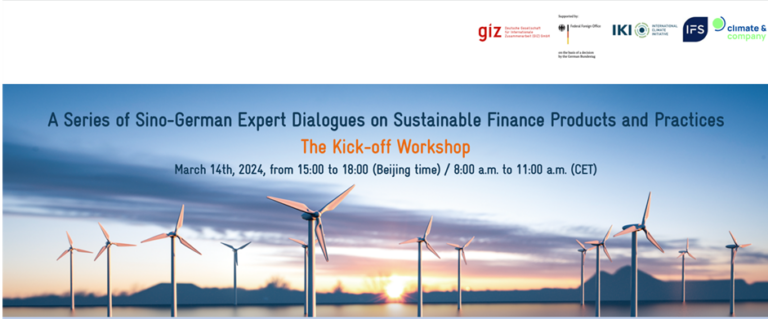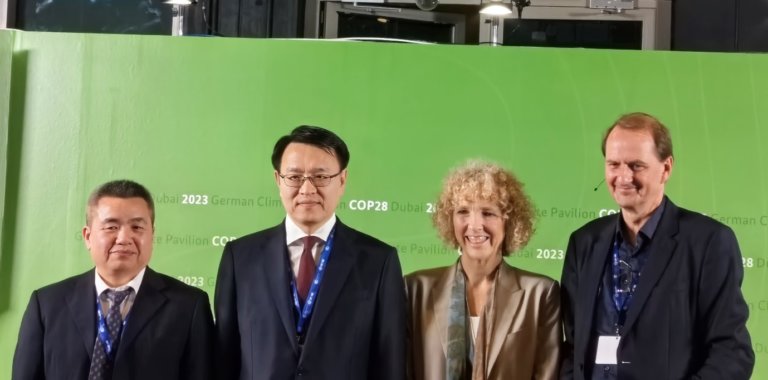On 6 April 2023, GIZ and the World Resources Institute (WRI) successfully co-organized the subforum on International Experience and Chinese Practices as part of the 2023 China International Forum on Climate Investment and Finance. The subforum included two sessions: Climate Investment and Financing for Carbon Neutrality: Ambitious Strategy, Market Practices, and Product Innovation and Incentivize Investment for Climate Change Adaptation: Climate Risk Management and Climate Resilient Urban Infrastructure Development. Jiang Zhaoli, Deputy Director General of the Department of Climate Change of Ministry of Ecology and Environment (MEE-DCC), Thorsten Giehler, Region Director of GIZ East Asia, and Fang Li, Chief Representative of WRI China, delivered opening speeches for the forum.
In his speech, Mr Jiang Zhaoli pointed out the tendency to prioritize mitigation over adaptation despite the fact that both mitigation and adaptation are critical components in addressing climate change. This has led to an unbalanced development of funding mechanisms for climate adaptation. The funding for climate adaptation has not been adequately secured and there is a lack of substantial support for adaptation projects. Therefore, he called for the government to play a guiding role in encouraging financial institutions and enterprises to actively increase investments in climate adaptation projects aiming at reducing vulnerability and improving resilience.

(Photo source: CIFA)
Thorsten Giehler, Region Director of GIZ East Asia, remarked that China’s economy is undergoing a profound transformation towards carbon neutrality following its announcement in September 2020 to achieve its 2030/2060 dual carbon goals. In the low-carbon and climate-resilience transition process, the financial sector plays a pivotal role in guiding capital towards the objectives of the Paris Agreement. The EU and Germany are currently taking steps to implement sustainable financial strategies and measures to ensure the realization of climate neutrality, resource efficiency, and a sustainable economic transformation. GIZ has cooperated with China for over forty years and has actively engaged in climate finance, green finance, and sustainable finance. It has done this by promoting dialogue and exchange between Chinese and German/European experts, sharing international best practices, fostering standard consensus, and providing capacity building along with technical support over the past six years. He looks forward to deepening support for China’s climate investment and financing sector through the Sino-German Cooperation on Climate Change – Climate Partnership Project implemented by GIZ.
During the discussion on the first topic, keynote speeches and high-level dialogues were held, aiming to foster innovation in climate finance and investment models, and to guide the green, high-quality development of financial services and product systems. Experts summarized and shared best practices, business experiences, and product innovations in financially supporting climate actions and helping the real economy achieve carbon neutrality. Among them, Karsten Löffler, Director of the Frankfurt School-UNEP Collaborating Centre for Climate & Sustainable Energy Finance, introduced Germany’s sustainable finance strategy, emphasizing the importance of enhanced transparency. Wang Yao, Dean of the International Institute of Green Finance of the Central University of Finance and Economics, summarized China’s efforts on sustainable finance, referring to pilot programs in Qingdao’s West Coast New Area and Wuhan’s Wuchang District. Wang Ying, Director of Corporate Sustainability at HSBC Bank (China), introduced HSBC’s global climate strategy and shared practical cases of supporting clients and emerging markets in low-carbon transition. Qi Lan, Director of GIZ’s Sustainable Finance Project, moderated this session.

During the panel discussion round, representatives, such as Peter Ling-Vannerus, Chief Representative of SEB Beijing; Michael Hsih, Deputy Head of China Market Development of Deutsche Börse Group; Wang Xiao, economist at the Asian Infrastructure Investment Bank; Huang Dafei, Executive Managing Director of Fixed Income at CICC; and Xie Wenhong, Head of China Program of Climate Bonds Initiative, discussed how to advance climate investment and financing both domestically and internationally.
The subforum’s second session, Incentivizing Investment for Climate Change Adaptation, was moderated by Li Xiaozhen, Sustainable Finance Lead of WRI China. Hou Fang, Deputy Director General of MEE-DCC, gave a keynote speech, highlighting the climate challenges of China and the strategies and actions as response. To address these challenges, China has formulated the National Climate Change Adaptation Strategy 2035, outlining key tasks and objectives, with a focus on strengthening climate change monitoring, early warning, and enhancing the adaptive capacity of ecosystems and socio-economic systems.

Tang Dingding, Honorary Chairman of Green Trade and Investment Committee of China Academy of Environmental Science and Senior Advisor at WRI China, in his keynote speech titled Investing in Climate Adaptation and Nature to Build Low Carbon and Resilient Cities in China, pointed out that improving infrastructure’s climate resilience and increasing investment can help avoid future losses and bring economic and socio-environmental benefits. He also mentioned that building resilient cities is critical for sustainable development and emphasized that urban managers should strengthen the resilience of economic, social, and ecological systems.
Cao Ying, Deputy Director of the Department of Policy and Regulation Research the National Centre for Climate Change Strategy and International Cooperation (NCSC) delivered a speech, Climate Finance in Support of Climate Change Adaptation in China. She emphasized the global deficit of climate adaptation funding and called for expanding financing channels. She suggested that government departments should play a guiding role in policymaking, project accumulation, and capital guidance, and that development finance institutions should provide support while promoting investment and financing for climate-adaptive construction.
During the panel discussion on climate adaptation, speakers, such as Lindsay Jiao, Deputy Director of Public Sector Solutions of Swiss Re China; Duan Xiumei, Director General of the Department of International Green Finance & Cooperation (PMO of ADB Project) of China National Investment and Guaranty Corporation; Tan Qingliang, Director of Climate Division of Shenzhen Ecological Environment Bureau; Qi Yue, Climate Manager of Children’s Investment Fund Foundation; and Liu Daizong, Director of Sustainable City Program of WRI China, discussed how to strengthen urban climate resilience through refining climate risk management, innovating investment, and financing models, and improving urban climate solutions from the perspectives of financial institutions, pilot cities, and international organizations.
This subforum served as an important platform for exchanging ideas to promote the development of climate investment and financing and to enhance urban climate resilience.



